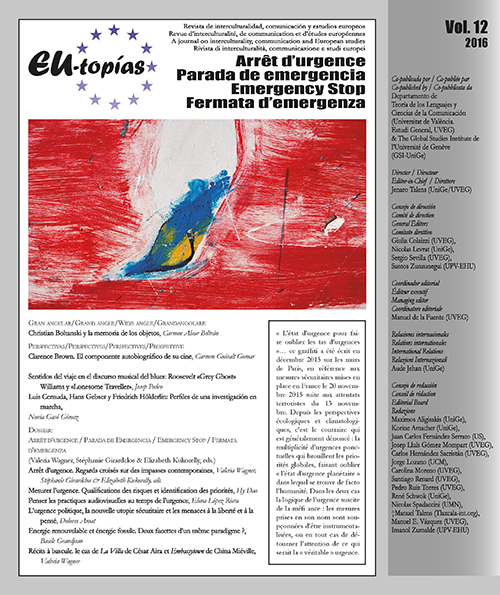Urgency in Politics, Security as a New Utopia, and their Threats to Free- dom and Thought
DOI:
https://doi.org/10.7203/eutopias.0.18644Keywords:
State of emergency, totalitarianism, Security State, Hannah Arendt, Giorgio Agamben Abstract
Abstract
After the terrorist attacks in the US in 2001, and since the new wave of attacks in Europe in the recent past, urgency has motivated and justified some of the most important political decisions, even in countries that were not directly aggressed. The search for full security, which seems to have become a new utopia, explains certain extra-legal decisions and promotes the extension of the faculties of executive powers in a growing number of countries. Thus, urgency threatens today the basis of democracy: it undermines the guarantees for the exercise of freedom, it discourages citizens’ participation in public affairs, it hinders debate and it stands in the way of thought and of autonomous judgment. Using Hannah Arendt’s research on totalitarianism and Giorgio Agamben’s analysis of Security States, this paper will show that the recurrent recourse to ‘urgency’ can generate, today, oppressive conditions. These conditions are different from those linked to the rise of totalitarian regimes in the past but they have some common points, which demand citizens’ reflection, judgment and action.
 Downloads
Downloads
 References
References
Agamben, Giorgio (2015), « De l’Etat de droit à l’Etat de sécurité », Le Monde (en ligne, 23 décembre 2015)
Agamben, Giorgio (2001), « Security and Terror », Theory & Event, 5 (4) (en ligne).
Arendt, Hannah (1981), The Life of the Mind, San Diego, New York: Harvest Book Harcourt.
— (1985), The Origins of Totalitarianism, San Diego, New York: Harvest Book Harcourt.
— (1993), Between Past and Future, Nueva York: Penguin Group.
— (2006), Eichmann in Jerusalem: A Report on the Banality of Evil, New York: Penguin Books.
Benhabib, Seyla (2000), « Arendt’s Eichmann in Jerusalem », Dana Villa (ed.), The Cambridge Companion to Hannah Arendt, Cambridge: Cambridge University Press, 2000, pp. 65-85.
Berkowitz, Roger (2013), « Misreading ‘Eichmann in Jerusalem’ », New York Times, 7 juillet 2013.
Evans, Brad (2013), Liberal Terror, Cambridge: Polity.
Fallorou, Jacques (2016), « Le big data, ce Big Brother qui ébranle les libertés individuelles », Le Monde (en ligne, 5 avril 2016).
Han, Byung-Chul (2014), La société de la fatigue, Paris : Circé.
Marchart, Oliver (2007), El pensamiento político posfundacional. La diferencia política en Nancy, Lefort, Badiou y Laclau, Buenos Aires: Fondo de Cultura Económica.
Strauss, Leo (1989a), « The Three Waves of Modernity », Hilaild Gildin (ed.) An Introduction to Political Philosophy, Ten Essays by Leo Strauss, Detroit : Wayne State University Press.
— (1989b), « An Introduction to Heideggerian Existentialism », Thomas L. Pangle (ed.), The Rebirth of Classical Political Rationalism: An Introduction to the Thought of Leo Strauss, Chicago: University of Chicago Press, pp. 27-48.
Young-Bruehl, Elisabeth (1983), Hannah Arendt: For Love of the World, New Haven : Yale University Press.
Downloads
Published
How to Cite
-
Abstract218
-
PDF (Français )75
Issue
Section
License
![]()
The authors conserve the copyright. All content published in EU-topías. Journal of interculturality, Communication, and European Studies are subject to the license Creative Commons Attribution-NonCommercial-ShareAlike 4.0 license. The full text of the license can be found at <http://creativecommons.org/licenses/by-nc-sa/4.0>
They may be copied, used, disseminated, transmitted and publicly displayed, provided that:
- The authorship and original source of the publication is cited (journal, publisher and URL of the work).
- They are not used for commercial purposes.
- The existence and specifications of this license of use are mentioned.
It is the responsibility of the authors to obtain the necessary permissions for images that are subject to copyright.



